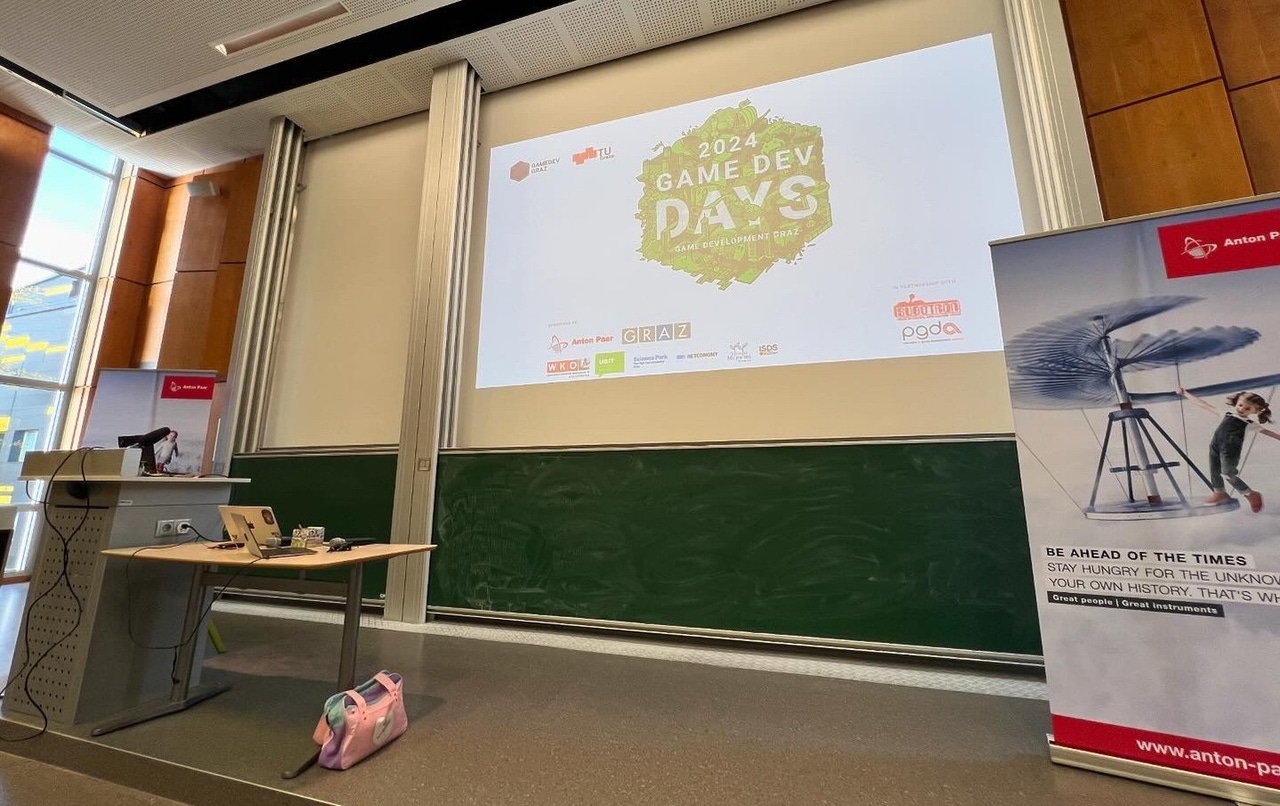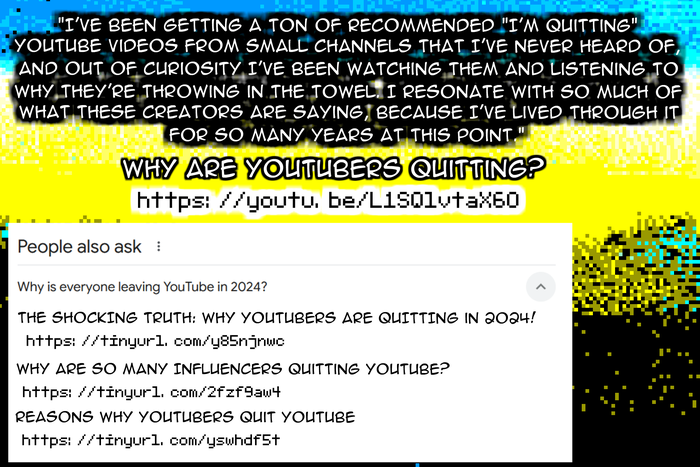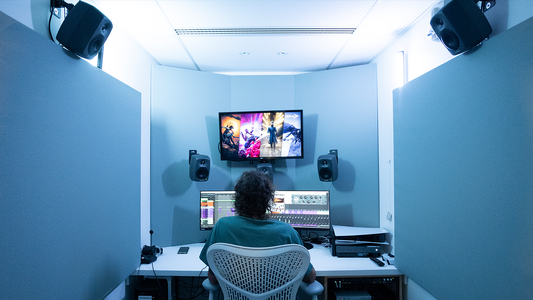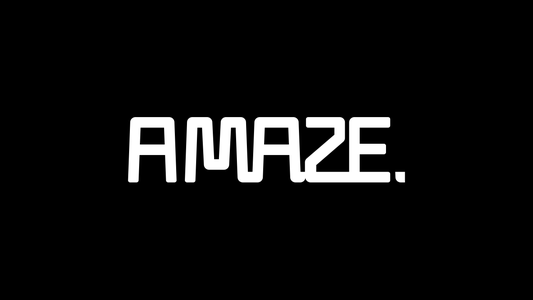
I was invited to be a keynote speaker at GamedevDays in Graz, Austria. I’m honored to have been invited to such a beautiful community and space. All the talks were incredible. I learned so much in just one day. If you ever have a chance to go, I can’t recommend it enough.
All my experiences up to now with speaking in Europe are inspiring me to want to write about the scene here. I’m constantly blown away by how much more people know about art games, arthouse games, or experimental games.
Like Berlin had this incredible Danielle Brathwaite-Shirley: THE SOUL STATION show. I’m seeing glimpses of this stuff being mainstream…almost…
It’s been beautiful!
Ok, so ramblings aside, following is my keynote turned into a blog post…
Years ago I started sharing small tools that I built for my games. I published them all as one-off standalone things.
They were usually presented as small silly digital toys, like a fake social media bar that would pour a constant stream of attention your way, simulating likes and hearts bursting out at whatever you did while using your computer, or a cute ASCII art drawing tool for if you wanted to quickly make some text art to decorate your posts with…
All this seemed like a cute idea. People generally enjoyed finding these bizarre things and then sharing them with friends.
I viewed these more like creating a “toy”. I always had this strong fascination with small non-game like digital objects, such as desktop pets, or prank software, because they all have this transformative quality to turning your digital world into something more unique. Something that adds a touch of color.
They break the heavily branded corporate monotony that seems to hover over our digital lives at all times. They remind us that these spaces belong to us too.
This, reclaiming a sense of personal expression in our digital world, is an important theme for today.
For example, when you exist on macOS the presences of Apple is always there. This is the same for Windows. Any personalization is very controlled.
I find it so fascinating that the presence of one silly little software thing, that runs purposelessly on your screen, can take back so much autonomy when people start collecting them.
When you go out and build or run these silly small things, they serve the purpose of customizing your space into something else. Something playful, goofy, a little enclave where you digitally live. Computers are our homes. We live there just as much as we do in the real world.
Older computer culture was really good at acknowledging this. For example, when customization was more of a thing like with Winamp skins, or sharing silly prank software was at the height of its popularity.
Teenage me would spend hours figuring out how to change the word “Start” on the Start Menu to “Fart”, or how to change the bootup screen to some silly Simpsons joke. It was common to find others online theming their machines like that.
There was always a need to take charge of your digital space. To make it something more. Something for you.
It doesn’t even take much to empower people to do this. Just give them something small and silly and it can turn into some precious little digital relic that they found and keep.
As I explored the theme of building and releasing silly cute purposefully useless software, I saw how important it was to people.
I eventually started this website where I had a collection of software themed around potatoes. It was called potatoware, with each program featuring a potato that takes up a large portion of screen-space, and it was always intentionally useless.
One of them, named “The Electric Love Potato“, was a desktop companion that would give you a constant stream of positive reinforcement. It was a continuous chatty presence in the corner of your screen, that occasionally serenaded you with really bad songs and potato recipes.
It literally does nothing useful. It goes against any good software practices. It’s completely unusable. Running it is bad usability. It is a constant disruption on your screen… Yet people really appreciated this distraction.
Its popularity was enough for me to make a second version where you could water your potato, comb, or discipline your potato for whatever reason. Sometimes your potato would feel threatened by other files on your machine and you would have to protect it.
Seeing how people appreciated these toys, I went on to making other desktop pets… like a little ghost that would haunt your screen and hide behind windows.
It is fascinating to me how people like collecting these. I was told that people would make a folder and treat those folders like they are a “home” to these silly digital creatures, including decorating the folder with little offerings to them (like image files).
I went on to explore this theme further by making a game that took place on your actual desktop, inside of folders, called “A Desktop Love Story“.
There were two folders, each with a file living inside them. One file, “the shy file”, was in love with “the cute file”, but couldn’t profess that love. Only you as a system administrator could help them fall in love and finally meet.
So you spent time passing around notes (plain text documents and images) between these two files, which one file generated for the other. A simple script in the files would read what you put into their directory, generate a response, and state was managed that way.
Eventually the two files agreed to meet, and you have to put them into the same folder.
Note that if you did this too early they would freak out because they were not ready to meet. They had to be ready.
When they were ready, you finally placed them together and they’d fall in love, supposedly living happily ever after in that folder. Also note that if you separate them after that, they would cry about losing their love.
People often tell me that they still have that folder with the two together, and they imagine the two having a happy file life there.
This is just a little thing that uses the actual desktop, and desktop folders, as a space to tell a story. It completely changes your perception of what a desktop and files are.
Even something as simple as files on a computer have a life that we can apply a narrative to.
This highlights that transformative quality these unusual things have. Suddenly your desktop is not just some space for work, but it’s a world to exist in. Play is possible here.
This has always been part of computers. That urge to make something our own, to extend it, to customize it, to be weird in it… is a cornerstone to exiting on the web or on a desktop.
We have such a long history of spaces, tools, platforms, software, that allowed customization and even thrived because of it.
We remember GeoCities because of that.
Computers empower people to be creative and enable a fantasy reality. We can be whoever we want on the web. That anonymity isn’t only necessary for expressing ourselves, it empowers us to explore aspects of ourselves we might not be able to in other contexts.
If we understand this, this need for users to exist like this, we can build in a positive direction that continues to keep this dream alive.
As game designers we, more than anyone, understand the value of fantasy realities.
The way this translates to tools and platforms I think is inspiring. Not only that but “fantasy realities” are necessary for building better realities.
The fantasy console movement, for example, I think is as beautiful as it is profound for how it lets participants create actual games in this entirely made up context. Pico-8’s accessibility, and even disarming way that it exists, makes it so approachable the community surrounding it is naturally supportive and positive.
The fact that it’s a fantasy reality, brought into practical reality by inviting participation with both play and creation, gives people a space to exist in that’s egalitarian.
It’s hard to imagine that Pico-8, or Bitsy devs, would be as exploitative as the larger game industry or any other issues plaguing mainstream games, because of the context these tools exist in.
Pico-8 keeps this dream of creative participation, fantasy reality, anonymity… alive because I could start participating there anonymously, and explore making things for that space, without any bar for entry or even pressure to output work a certain way.
The stakes are low and creative autonomy is in my own hands.
When I started this journey that eventually led me into game design, I began as some high school kid dabbling with interactive art for the web because I was inspired by the net-art movement. I was enamored by the idea that I could bypass curation, galleries, and what seemed (at the time) an incredibly unattainable art world that would never let me be part of it because I didn’t have access to the types of things that would enable an artist to be seen.
With the web I could just publish my work, and people could see it. I could grow on my own, on my own terms, anonymously.
The internet put power into my own hands. It gave me that freedom.
I put out this collection of interactive poetry pieces called BlueSuburbia. It was an online world of animated poems, and spaces that a visitor could explore. I was studying animation at the time, so BlueSuburbia was like existing in a giant animation that you could click through to trigger or explore its tangents.
The bar for entry was very low. Flash made it easy to make something richly animated, with lots of sounds, music, programming… I didn’t need to know any engines or game design. I could grow on my own terms, learning to code as I needed it.
I think this is still a beautiful thing about computer culture, and the internet, this sort of complex output is made simple because of tool makers that made it accessible to someone like me.
Now I can make tools too, and I “give back” by doing so.
We are all participants in this type of positive upward spiral.
BlueSuburbia grew to having a cult following. It was a lot for a highschooler. I enjoyed following people’s reaction to the work, and speculation about who made it. I was fairly anonymous at the time. Nobody knew that it was just some high school kid making this. My friends didn’t know, my teachers didn’t know… I worked on it during break in the library, or after school. I didn’t really share my secret art project with anyone.
People online loved it. It would constantly get shared in impressive sounding places, and got put on some curriculum for interactive art. Nobody knew it was me.
I would get people sending me their resumes. When they found out it was just some kid doing this they would stop talking to me…
I make it a point to share all this because I don’t think I would have found this creative path if it wasn’t for anonymity.
I couldn’t have done it without this low-stakes fantasy possibility space that was the early internet.
Here, I could make something without any obligation to anyone, and there was a healthy boundary between myself and the people that called themselves fans of it. I didn’t owe anyone anything just because they liked it.
Contrast this to today, where artists have to have a constant calculated presence on social media, and share a lot of time, energy, or aspects of themselves to promote their art. There’s really no sense of boundaries here. Having those would even be counterproductive to successfully existing on these platforms, or building a following.
Existing becomes a form of competition in context of the social media web. It’s a type of constant aggressive public performance, rather than a space for self-expression.
I draw this distinction because we, as developers and creators, still have the autonomy to do better. The internet is still a massive possibility space where we can invent better avenues of participation. We are not that powerless to the whims of corporations.

Links in this slide…
– Why Are YouTubers Quitting?
– Why Youtubers are Quitting in 2024
– Why Are So Many Influencers Quitting Youtube
– Reasons Why Youtubers Quit Youtube
I often think to what extent the game industry’s reliance on centralized algorithm based social media, like Twitter, actually caused harm in the way it encourages us to dunk on eachother, or drag eachother for ultimately irrelevant things often taken out of context. Social media rewards controversy and manufactured outrage.
It’s easy to get sucked into participating in the hamster wheel of takes because you want to be part of something, but to what extent?
Who do we alienate with that behavior?
Who have we alienated when we all jumped into a conversation that was rooted in dunking on someone?
It happened so often that it became normal… It’s hard to imagine any other contex





































